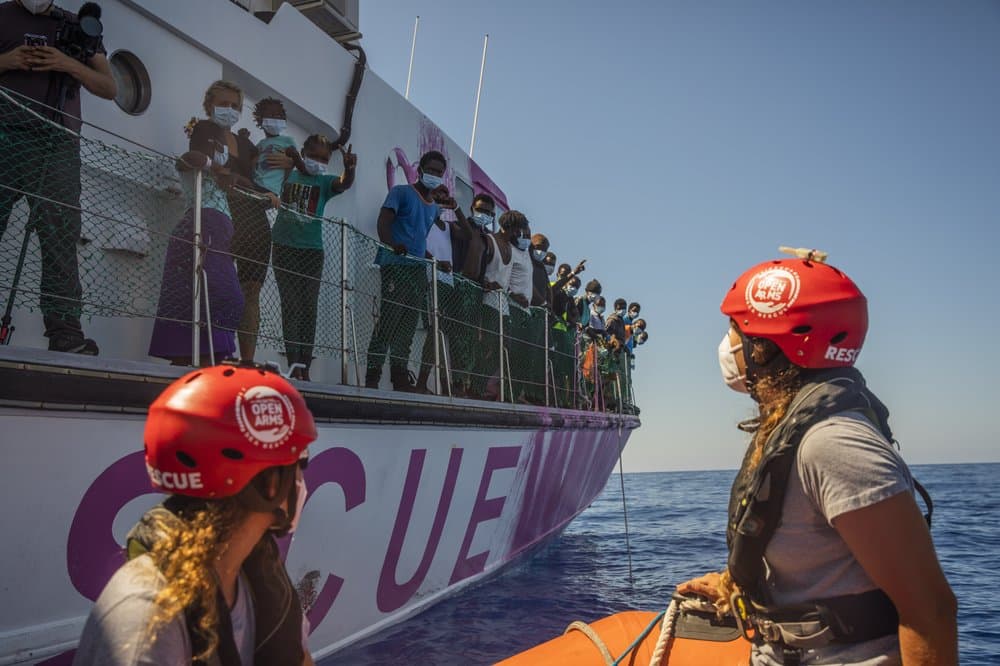ROME – When Pope Francis traveled to the small Italian island of Lampedusa on his first papal trip outside Rome in 2013, it was a statement to the world about the welcome migrants ought to receive.
Now, seven years later, the island is struggling to balance that vision of welcome with an influx of migrants in such high numbers that people are now sleeping on the streets, with no toilets, showers, or methods to ensure proper sanitation.
Locals are perplexed and frustrated as more migrants continue to arrive, even amid the COVID-19 coronavirus crisis, and have called on the government to transfer some migrants to the mainland, adding that spreading them out will ease the burden for everyone.
Although Lampedusa, which sits closer to Tunisia and Libya than to Italy’s mainland, has long been the primary destination for migrants arriving from North Africa, things started to heat up Sunday after the arrival of some 370 migrants on an old fishing boat.
Lampedusa’s migrant reception center currently houses around 1,400 migrants – well over the center’s capacity, and those turned away due to lack of space have carved out areas for themselves in public parks, on the beaches, and on the streets.
Some migrants are also being hosted by the Casa della Fraternita’ attached to the island’s San Gerlando parish, which is overseen by Father Carmelo La Magra.
But with locals angered by what they see as the disintegration of their city, frustrations are running high. Sunday night’s arrivals exacerbated the situation, and locals took to the streets to protest new arrivals, with 300 more due in the coming days.
Lampedusa’s mayor, Totò Martello, has threatened a general strike on the island if the issue is not dealt with.
Speaking to Italian Catholic news agency SIR, La Magra said the locals are asking the Italian government “that not so many people be held in Lampedusa. Staying in the hotspot is not respectful of the rights of human beings, because there are no spaces or necessary services.”
Referring to rumors that migrants are “invading” Lampedusa, La Magra said this is false, but recognized that newcomers are “in serious need; they sleep on the ground, under the trees, there are no toilets for everyone, and this is inhumane.”
“It is complicated to manage everything when the numbers are so high,” he added, noting that concerns about spreading the coronavirus are also something to consider.
There are currently two boats that have been designated as quarantine spaces for incoming migrants, who must stay on one of the ships for 14 days and undergo a coronavirus test before they are allowed to disembark.
In order to calm the rising storm, the Italian Ministry of the Interior has promised to begin transferring migrants to other places.
In a statement, the ministry said it is following the situation in Lampedusa with “extreme attention” and announced that Italian Prime Minister Giuseppe Conte and Interior Minister Luciana Lamorgese ordered three more ships to be sent as quarantine spaces.
The first is expected to arrive to Lampedusa Tuesday, with the other two coming by Wednesday.
La Magra voiced skepticism that the new boats would make a difference, insisting that they fill up fast and that most of the people on them have already been tested.
“If there was suddenly a positive case it would be event worse,” he said, speaking of the overall situation.
“It would be better,” he said, “to ease the pressure on the island by bringing more people to the mainland. They would be more useful if they shuttled between Porto Empedocle and Lampedusa. Also, because they are not unmanageable numbers if transferred to other places.”
Porto Empedocle is a small coastal commune off the Italian island of Sicily.
La Magra recalled holding a prayer event several nights ago for the victims of a fire that broke out on a ship carrying migrants as they were being rescued, killing three and leaving one missing. The event was promoted by British street artist Bansky, who has funded a boat, the Louise Michel, as a refugee rescue ship in Lampedusa.
“Many should follow him,” La Magra said, adding that “We will continue to see tragedies because there are no legal avenues and there are no rescues at sea.” Bansky’s boat, he said, is “a sign, because only one boat does not solve the problem, but it tells us that it is possible to do it.
Noting that Bansky used the #Blacklivesmatter hashtag on social media to promote his prayer event, La Magra said that “If the slogan is valid for America it should apply to everyone, even in Europe. Every life has value.”
La Magra also voiced his hope that several NGOs that rescue migrants, including Sea Watch and Open Arms, will be able to carry out their work uninterrupted.
Both organizations have recently returned to sea, however, “the government always seemed worried about NGOs so it could make military ships available for rescue,” La Magra said, but stressed that, “We do not care who does it, as long as someone does it.”
Follow Elise Ann Allen on Twitter: @eliseannallen













